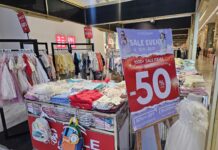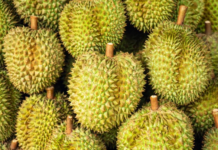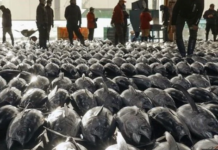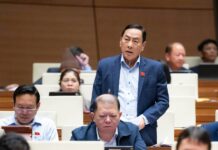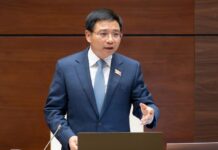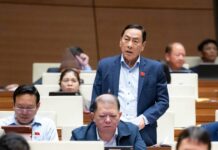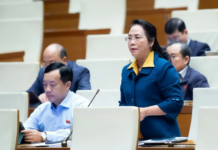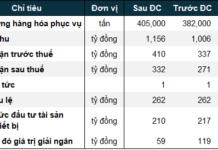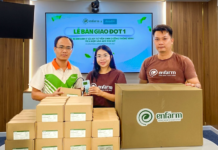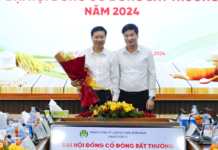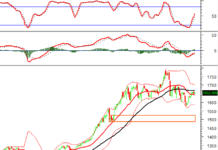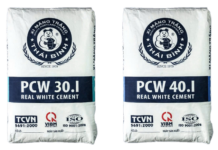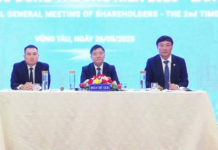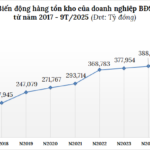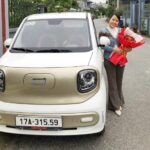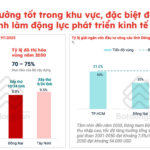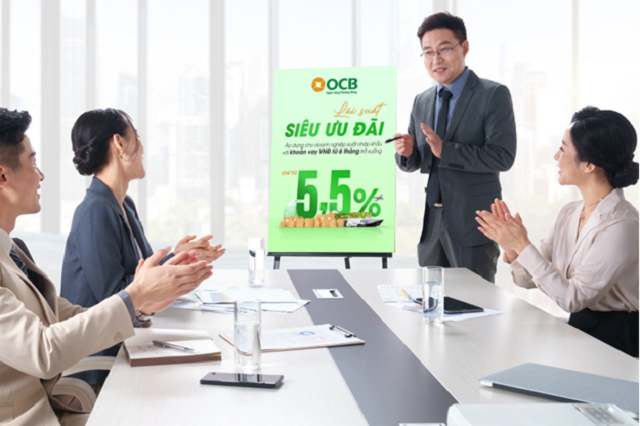Vietnam has achieved the highest score on the UOB ASEAN Consumer Sentiment Index (the Index), launched on November 20, 2025, with 67 points—significantly surpassing the regional average of 54 and marking a three-point increase from the previous year. This reflects Vietnamese consumers’ robust confidence in both the national economy and their personal financial prospects.

Launch event of the UOB ASEAN Consumer Sentiment Index on November 20, 2025.
|
The UOB ASEAN Consumer Sentiment Index is built on six component indices measuring consumer perceptions of current and future economic conditions, as well as personal financial situations. On the macro front, over 8 in 10 Vietnamese survey respondents expressed optimism about the country’s overall economic situation, with the component index in this area rising 12 percentage points compared to 2024. This sentiment is bolstered by impressive macroeconomic results in the first half of 2025, including a 7.52% year-on-year GDP growth—the highest first-half growth since 2011.
Vietnamese consumers exhibit stronger confidence than their regional counterparts in the nation’s political, economic, and social stability. This optimism persists despite global uncertainties, including U.S. tariff policies announced on April 2, 2025. Stable commodity prices and consistent foreign direct investment (FDI) inflows have further solidified positive outlooks. UOB’s latest economic forecast, released last month, revised Vietnam’s full-year GDP growth projection upward to 7.7%, from 7.5%, following Q3’s remarkable 8.23% growth.
Confidence in the macroeconomic environment has translated into optimism about personal finances among Vietnamese consumers. Over 70% of survey participants expect their financial situations to improve in the coming year. Concerns about rising living costs have decreased compared to last year, dropping three percentage points to 50%, with a notable 12-point decline among Gen Z. However, Vietnamese consumers remain focused on income stability and long-term financial commitments, particularly within the Gen Y demographic.
“We are delighted to see Vietnamese consumer sentiment remain resilient, reflecting growing optimism about both the macro environment and personal finances,” said Paul Kim, Managing Director of Personal Financial Services at UOB Vietnam. “Despite global challenges, Vietnam has demonstrated strong fundamentals and effective policy direction. This momentum is driving consumer spending and increased interest in financial planning.”
Vietnamese consumers are shifting focus toward environmental concerns and experiential spending.
As inflation worries ease, Vietnamese consumers are increasingly prioritizing broader issues such as environmental factors. The study reveals that climate change, natural disasters, and pollution are now top concerns for 66% of respondents, surpassing economic factors like U.S. tariffs (59%). This shift is reshaping purchasing behavior, with one in three Vietnamese consumers willing to pay more for eco-friendly products—11 percentage points above the regional average.
Alongside environmental awareness, financial confidence is driving increased spending in key areas during 2025. The ACSS shows that 67% of Vietnamese consumers report higher spending on education, healthcare, and wellness, surpassing daily essentials like utilities, transportation, and food (53%). Over half also report increased spending on premium and experiential categories, reflecting a growing desire for lifestyle upgrades. Eight in ten consumers view experiences like entertainment events, fine dining, and luxury travel as essential to their lives.
Aligning with ACSS findings, UOB customers in Vietnam have indeed increased spending on experiential categories. Total card spending on dining, entertainment, and travel in Vietnam rose 8% year-on-year, with entertainment spending up 48% and travel up 8%.
To cater to consumers’ evolving preferences, UOB Vietnam is enhancing its retail banking portfolio to deliver exceptional value and unique lifestyle experiences. Recently, the bank refreshed its credit card offerings with features and benefits tailored to modern consumer needs. Through strategic partnerships with leading regional and local brands, UOB cardholders enjoy exclusive privileges in travel, dining, shopping, and entertainment—over 1,000 offers across the region. These include early access to global entertainment events, exclusive dining deals, attractive travel discounts, and unique nature experiences like exploring Son Doong Cave, one of the world’s most spectacular natural wonders.
Most Vietnamese consumers show strong financial preparedness, but Gen Z lags significantly.
Vietnamese consumers continue to demonstrate robust financial preparedness, with 94% of survey respondents feeling confident in managing their personal finances. Key findings include:
- 86% believe they have sufficient emergency funds
- 79% are confident in managing current debts
- 82% feel adequately insured
- 76% believe their investments support long-term goals and retirement plans.
Savings habits remain stable, with eight in ten Vietnamese consumers saving over 10% of their monthly income, particularly among women. 57% also report having accumulated enough to cover three to six months’ expenses.
Private health insurance is common in Vietnam, with 44% of consumers holding private health coverage in addition to state-provided insurance. However, life insurance ownership has dropped 14 percentage points from last year and is now below the regional average. Interest in specialized insurance products like term life and disability insurance is rising, with participation increasing 9 and 16 percentage points, respectively.
Investment behavior shows a growing divide. While many Vietnamese consumers actively seek financial knowledge, fewer translate this into action. Only 57% invest more than 10% of their annual income, a 13-point decline from last year. Fixed bank deposits remain the most popular investment, chosen by 93% of respondents, indicating increased caution among consumers.
Among consumer groups, Gen Z stands out as the least financially prepared. The study shows 5% of Gen Z have no emergency funds or insurance, and fewer than half (47%) have savings to cover more than three months’ expenses. Only 33% hold private health insurance, and life insurance ownership is lowest in this group at 43%. Notably, 13% feel completely unprepared to manage current debts.
This financial preparedness gap is linked to Gen Z’s lifestyle-focused spending behavior. The study finds 77% of Vietnamese Gen Z respondents prioritize enjoying life now over worrying about the future, and the same percentage feel societal pressure and peer expectations make saving difficult—the highest rate across all age groups.
While Gen Z values living in the moment, they can still enjoy life while building a strong financial foundation for the future. UOB is committed to supporting customers at every life stage by providing comprehensive savings, investment, and protection solutions, enhancing financial preparedness for all clients.
– 17:25 20/11/2025
Vietnam’s Race to Join the Global Semiconductor Map: Can It Keep Pace as the World Shifts?
Global supply chain disruptions and robust policy commitments present a unique opportunity for Vietnam to emerge as a leader in the semiconductor industry, the backbone of the digital economy. However, this potential can only be realized if Vietnam successfully navigates challenges in workforce development, infrastructure enhancement, and regional FDI competition.
Unbelievable Deal: Purchase Premium Durian Export Profiles for Just Hundreds of Millions VND!
Police have identified service providers offering export procedures, including regional planting code registration, cadmium and gold testing, at prices ranging from 140 to 200 million VND.



